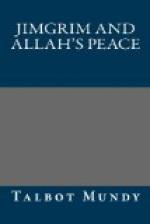“You see,” he said, by way of apology when I laughed at a string of names that to me conjured up only confusion, “my beat is all the way from Cairo to Aleppo—both sides of the Jordan. I’m not on the regular strength, but attached to the Intelligence—no, not permanent—don’t know what the future has in store—that probably depends on whether or not the Zionists get full control, and how soon. Meanwhile, I’m my own boss more or less—report direct to the Administrator, and he’s one of those men who allows you lots of scope.”
That was the sort of occasional glimpse he gave of himself, and then switched off into straight statements about the Zionist problem. All his statements were unqualified, and given with the air of knowing all about it right from the beginning.
“There’s nothing here that really matters outside the Zionist-Arab problem. But that’s a big one. People don’t realize it— even on the spot—but it’s a world movement with ramifications everywhere. All the other politics of the Near East hinge on it, even when it doesn’t appear so on the surface. You see, the Jews have international affiliations through banks and commerce. They have blood-relations everywhere. A ripple here may mean there’s a wave in Russia, or London, or New York. I’ve known at least one Arab blood-feud over here that began with a quarrel between a Jew and a Christian in Chicago.”
“Are the Zionists as dangerous as the Arabs seem to think?” I asked.
“Yes and no. Depends what you call danger. They’re like an incoming tide. All you can do is accept the fact and ride on top of it, move away in front of it, or go under. The Arabs want to push it back with sword-blades. Can’t be done!”
“Speaking as a mere onlooker, I feel sorry for the Arabs,” I said. “It has been their country for several hundred years. They didn’t even drive the Jews out of it; the Romans attended to that, after the Assyrians and Babylonians had cleaned up nine-tenths of the population. And at that, the Jews were invaders themselves.”
“Sure,” Grim answered. “But you can’t argue with tides. The Arabs are sore, and nobody has any right to blame them. The English betrayed the Arabs—I don’t mean the fellows out here, but the gang at the Foreign Office.”
I glanced at his uniform. That was a strange statement coming from a man who wore it. He understood, and laughed.
“Oh, the men out here all admit it. They’re as sore as the Arabs are themselves.”
“Then you’re on the wrong side, and you know it?” I suggested.
“The meat,” he said, “is in the middle of the sandwich. In a small way you might say I’m a doctor, staying on after a riot to stitch up cuts. The quarrel was none of my making, although I was in it and did what I could to help against the Turks. Like everybody else who knows them, I admire the Turks and hate what they stand for—hate their cruelty. I was with Lawrence across the Jordan—went all the way to Damascus with him—saw the war through to a finish—in case you choose to call it finished.”




